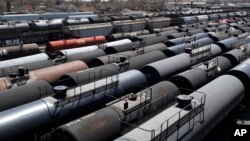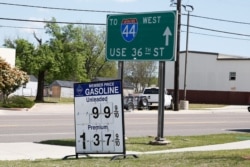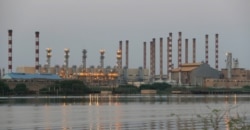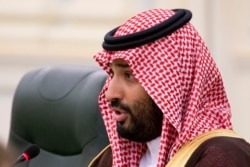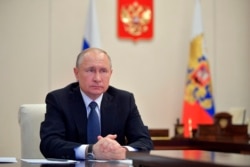A week ago, the Organization of the Petroleum Exporting Countries (OPEC) and its allies agreed to slash production by 9.7 million barrels, a deal that brought an end to a price war between two of the biggest exporters, Russia and Saudi Arabia.
But the coronavirus pandemic has made that deal irrelevant.
“It is increasingly clear that oil demand is dropping too quickly for supply agreements to keep pace,” said Ben Cahill, an analyst at the Center for Strategic and International Studies.
The commercial standstill the virus has created has dried up demand for oil, prompting a massive glut and turning the price of oil negative on a key U.S. benchmark for the first time ever.
Brent crude is not trading in negative territory, but June futures for Brent crude plunged by more than 20% Tuesday to below $20 a barrel.
With aircraft parked on runways, cars idled in garages and factories shuttered in many parts of the world, the need for oil has diminished, leaving producers paying buyers to take it off their hands.
Demand has dropped by 30 million barrels a day, and there is very little storage left to stockpile oil.
The Economist Intelligence Unit (EIU) reported this week that crude stocks have built to 504 million barrels, their highest levels since 2017, despite slowing production. And with production continuing because wells can’t be shut down, stocks are only going to grow.
The collapse in oil prices has created a bleak outlook for a number of companies and also could lead to dire political consequences for governments in the Middle East and Russia, whose budgets are already strained and who depend on fossil fuel revenue, say Western diplomats and political analysts.
If oil prices do not recover soon, analysts warn, even strong central powers risk destabilization.
The drop in prices comes at a difficult time for many governments in the Middle East. According to Julien Barnes-Dacey of the European Council on Foreign Relations, the coronavirus is “just one crisis on top of multiple crises — economic, political, conflict — and it raises the question: ‘Is this just one other element that pushes the region over the edge,’ particularly if you put it beside the collapse in oil prices, which has gutted the finances of Saudi Arabia and Iraq.”
Their one hope is that economic recovery is swift after the pandemic ends and demand for oil mounts quickly, outstripping supply and sending prices soaring. But working through the stockpiles will take time, and demand will likely be subdued as the world works through a global recession.
“Demand will remain subdued for an extended period,” the independent Rystad Energy said.
“The price plunge will result in a huge loss of revenue for oil and gas producers,” said David Jalilvand, managing director of Berlin-based Orient Matters. “Most of them have already been accumulating fiscal deficits, which are now set to widen substantially,” he noted in an online commentary before oil prices turned negative.
The collapse will add to “a significant economic deterioration right across the Middle East and may well aggravate already mounting geopolitical tensions in the Gulf,” Jalilvand warned.
Saudi Arabia and the United Arab Emirates may be able to tap into cash reserves and borrow from international capital markets to cushion the blow in the short term, but others, like Iran, already squeezed by U.S. sanctions, and Iraq, won’t have that option, he added.
Iraq and Iran
Oil revenue generated around 95% of the Iraqi government’s budget last year. A budgetary crisis will make it difficult for it to pay the salaries of public servants and the army, as well as Shi’ite militias. It will also compound the difficulties Iraq was having in providing basic public services such as power and health care, analysts say.
Even before the coronavirus appeared, the country was immersed in political crisis. Cuts in social spending will only aggravate political stability.
Iran’s gross domestic product contracted last year by around 9.5%, and runaway inflation of 35% has eroded the purchasing power of ordinary Iranians. While only 30% of the government’s budget comes from oil revenue, Tehran has little financial room to maneuver and will also have difficulty paying for social spending — risking further unrest in a country that has experienced rising public anger.
Saudi Arabia
Other Middle East countries could see major political ramifications, including Saudi Arabia, where Crown Prince Mohammed bin Salman is looking to consolidate his hold on power.
The preeminent Gulf kingdom has a widening fiscal deficit and shrinking reserves, and Salman’s plans for economic transformation risk being upended by budget cuts, as government revenue falls because of the pandemic and plummeting energy prices.
In recent months, there has been mounting behind-the-scenes criticism of Salman from members of the royal family who have been marginalized in his rise to power. Last month, there were unconfirmed reports that Salman thwarted an attempted palace coup.
Russia
Russia also faces high political risks. The price plunge is “sapping the lifeblood of the Russian economy practically overnight,” said Eugene Rumer, a former U.S. national intelligence officer who is now a senior fellow at the Carnegie Endowment for International Peace.
Russian newspaper Vedomosti reported Tuesday that a barrel of Russia’s Urals oil was trading at $8.48 a barrel, the lowest price since 1998. Two-thirds of Russia’s export earnings and 40% of its budget revenue is generated by oil sales.
The Ministry of Finance announced earlier this year that Russia’s finances can withstand prices as low as $25 a barrel for up to 10 years by drawing on a $150 billion National Wealth Fund to compensate for shortfalls in the government’s budget.
Some observers suspect this is an over-optimistic assessment and doesn’t consider the promises Putin made earlier this year in his annual State of the Union address to raise living standards, which have stagnated for the past half-decade.
“The current budget is calculated at an oil price of $42 per barrel, and that, combined with foreign currency reserves of $570 billion, could indeed provide a cushion — but only in the short term,” said Margarita Assenova of the Jamestown Foundation.
In the past few months before the coronavirus appeared, discontent appeared to be mounting across the country, with an increase in protests over living conditions.
“It is becoming increasingly clear that if oil prices do not recover, President Vladimir Putin is unlikely to deliver on his promise to increase social spending,” Assenova said. And that will not help the Russian leader “secure his position as de facto president for life” after starting changes to the Russian constitution.




